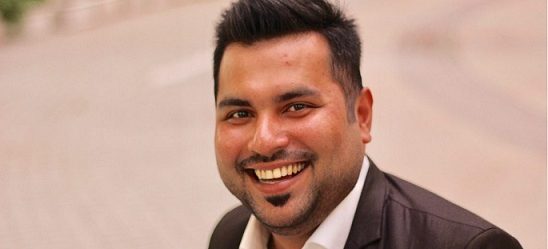Environmental activism is not the first idea that springs to mind when thinking about Gulf countries. This is precisely what drove Neeshad Shafi from Doha, Qatar, to launch the Arab Youth Climate Movement in Qatar (AYCMQA) in 2015. “I realized that most people in the region were barely aware of the existence, or the magnitude, of the climate crisis, even though Qatar had hosted the UNFCCC summit in 2012,” says Shafi.
The aim of his NGO is to engage regional youth through education, online campaigns and training, which are delivered in collaboration with national and regional partners. Communication is at the heart of Shafi’s vision to overcome what he sees as the biggest obstacles to youth engagement: a sense of detachment from the climate crisis and a feeling of powerlessness to tackle it.
“Do we feel vulnerable to climate change? More often than not, the answer is ‘no,’ and this influences our behavior,” explains Shafi, who has a background in water design engineering and has been named by the World Economic Forum (WEF) as a Global Shaper as well as one of the World’s 100 Most Influential People in Climate Policy for 2019 by Apolitical. “In other cases, people feel overwhelmed by the scope of climate change impacts, which makes individual action seem awfully pointless.”
Hence his emphasis on wide-scale advocacy, education and communication efforts to change people’s perceptions and collective behavior. Shafi knows that transforming how entire generations of people think and act will take time, so he believes in the importance of starting now, in the spirit of the proverb ‘yesterday you said you would begin tomorrow.’
And he is taking action indeed. He participates in various global environmental youth groups and summits related to climate policy and the Sustainable Development Goals (SDGs). He has also been active in the UNFCCC climate negotiation process since 2012 and is an indefatigable advocate of youth as partners for climate action at international forums.
GREEN GROWTH APPROACHES
From Shafi’s perspective, deeply-ingrained conflicts and social issues in the Middle East have pushed climate change down the agenda in most Arab countries.
The media, for example, has traditionally covered global warming as a series of international negotiations of little interest to a regional readership, rather than delving into potentially controversial local causes and solutions. As a result, citizens have been putting little pressure on authorities to take the climate crisis seriously.
One of AYCM’s objectives is to emphasize the huge stakes for countries in the Gulf and beyond. “The intertwining challenges of climate change, water stress, food scarcity and urbanization present a particularly thorny problem set; if unresolved, they could tip the region toward a cycle of instability and economic stagnation, upsetting efforts to promote much-needed economic growth and reform,” explains Shafi.
This is why he calls for green-growth approaches and for stronger partnerships between environmental NGOs, governments and the private sector. With political will and foresight, he says, Arab countries can develop innovative policy solutions to the region’s environmental and development needs.
“Sooner rather than later, young Arabs will be compelled to engage in new forms of activism to respond to environmental challenges in the region,” he says.
Despite the challenges, Shafi sees more and more young Arabs taking the climate crisis seriously – a glimpse of hope for a sustainable future that pushes him to tread onward.


Recent Comments